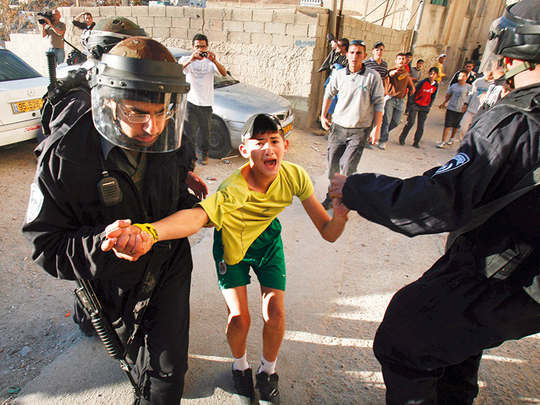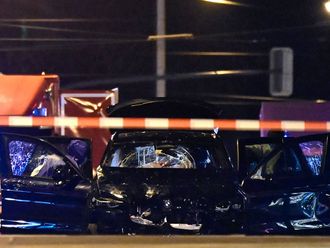
Dubai: Ahed Tamimi is back home with her family, but hundreds of Palestinian children still face an unknown future.
The 17-year-old Tamimi’s case was only one of many involving Palestinian youngsters held in Israeli regime jails, Palestinian human rights advocates have said.
Children are arrested, interrogated and subjected to mistreatment and torture to “confess” to whatever the occupation regime accuses them of doing, said the advocates and human rights defenders.
“When there is a video or a picture, it [the topic and the person] becomes more attractive and increases the appetite of the media,” said Ayed Abu Qtaish, advocacy director for Defence for Children International (DCI) — Palestine. The DCI’s Palestinian office in the West Bank is one of 50 offices the DCI has worldwide.
Abu Qtaish was referring to the videos that went viral in which Tamimi was shown assaulting an Israeli occupation soldier. She was given eight months in jail by an Israeli military court and was released on Sunday after serving her term.
There are many children like Tamimi who are still in Israeli prisons, said Tahseen Elayyan, Programme Director of Al Haq, an independent Palestinian human rights organisation based in the West Bank city of Ramallah. Al Haq was established in 1979, and enjoys a special consultative status with the United Nations Economic and Social Council.
“There are many children with stories like that of Ahed Tamimi or worse, but they didn’t become famous in the media, and they are still in prison,” Elayyan told Gulf News in an interview.
Currently, there are nearly 290 Palestinian children in Israeli prisons, Abu Qtaish told Gulf News. In total, almost 2,000 children have been arrested between 2000 and present.
“To us [defenders of children’s rights], the important aspect of the arrest of children is the mistreatment and torture they are subjected to. Almost all children who were arrested faced different forms of torture and mistreatment, whether physical or psychological, such as threats or solitary confinement,” he said.
During the past year, there have been 25 documented cases of children being put in solitary confinement. The average duration they spent alone in the one-by-two-metres cell was 14 days, Abu Qtaish said.
The UN defines children as those who are under the age of 18. However, Israel considers only those under 16 to be children.
The aim of exerting physical and psychological pressure on Palestinian youngsters is to obtain confessions, and that “confession is used by the Israeli military courts against them”, Abu Qtaish said.
In these courts, there are no fair trials, he said.
According to Israeli occupation military orders, verdicts against Palestinian children vary according to their age. Those who are under 12 years are not sent to court and are released after a short period of detention. Punishment for those who are between 12 and 13 years old has a ceiling of six months of imprisonment. And the maximum sentence for those between 13 and 14 is one year, unless the sentence is for a “crime” for which the occupation regime prescribes a maximum prison sentence of five years or more. For children between 16 and 17, the punishment rules are the same as they are for adults. Some have faced life imprisonment.
Apart from the psychological pressures, detention of children affects their rights in other aspects, including the right to education, activists said.
The issue of Palestinian children in Israeli prisons is a “very big problem,” said Elayyan.
“The Israeli regime is trying to break children and their patriotic spirit, regardless of the degree of that patriotism,” said Elayyan.
Israeli occupation authorities are focusing on Palestinian adolescents, activists said, because the Palestinian population is very young, with nearly 30 per cent of them falling in the 15-29 age group.
By smashing Palestinian youngsters’ nationalist values through detention and punishment of children, Israel “puts obstacles in the way of the young Palestinians’ patriotism … (and) breaks their will so they will never ever think again of national struggle. It also hopes this will be a lesson for others who might think of opposing Israel,” Elayyan said. He said Palestinian parents do love their children, unlike Israeli claims that they send them out to die.












